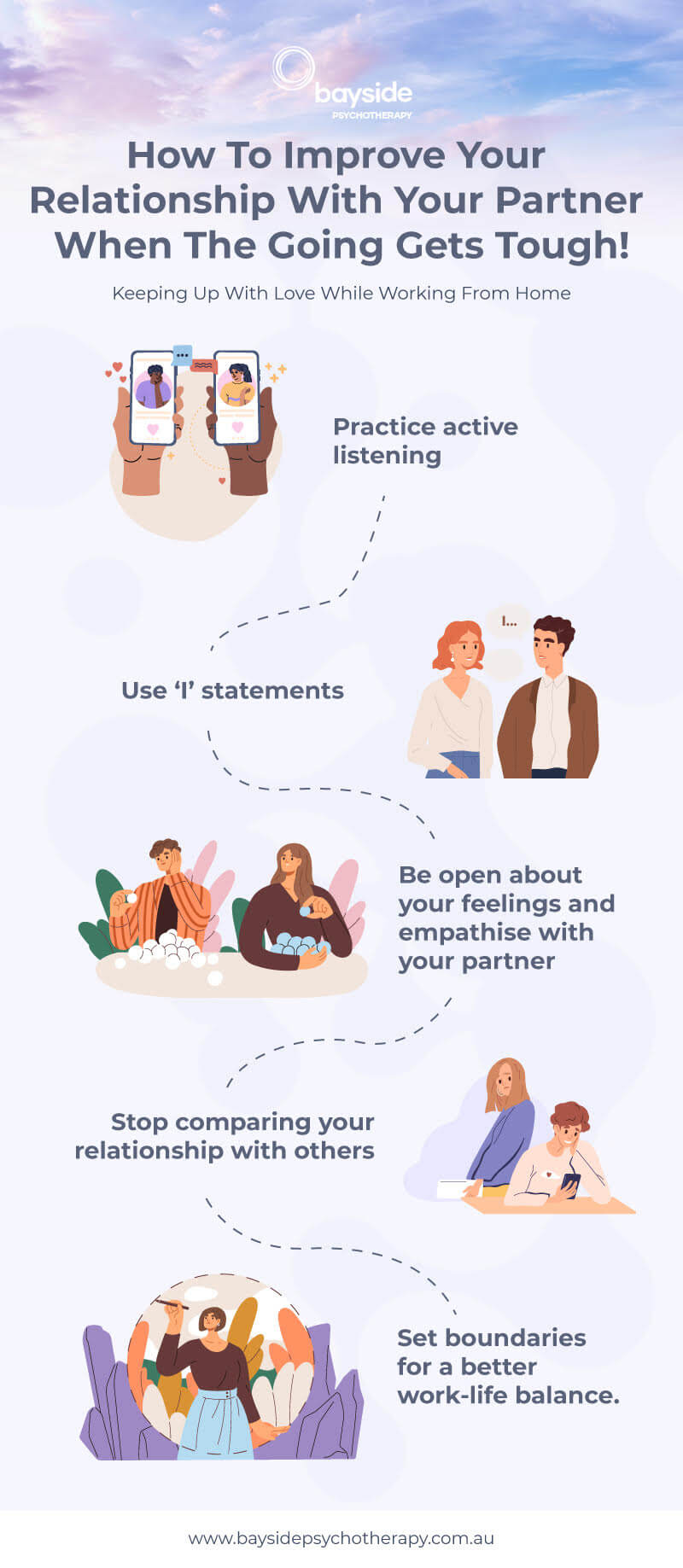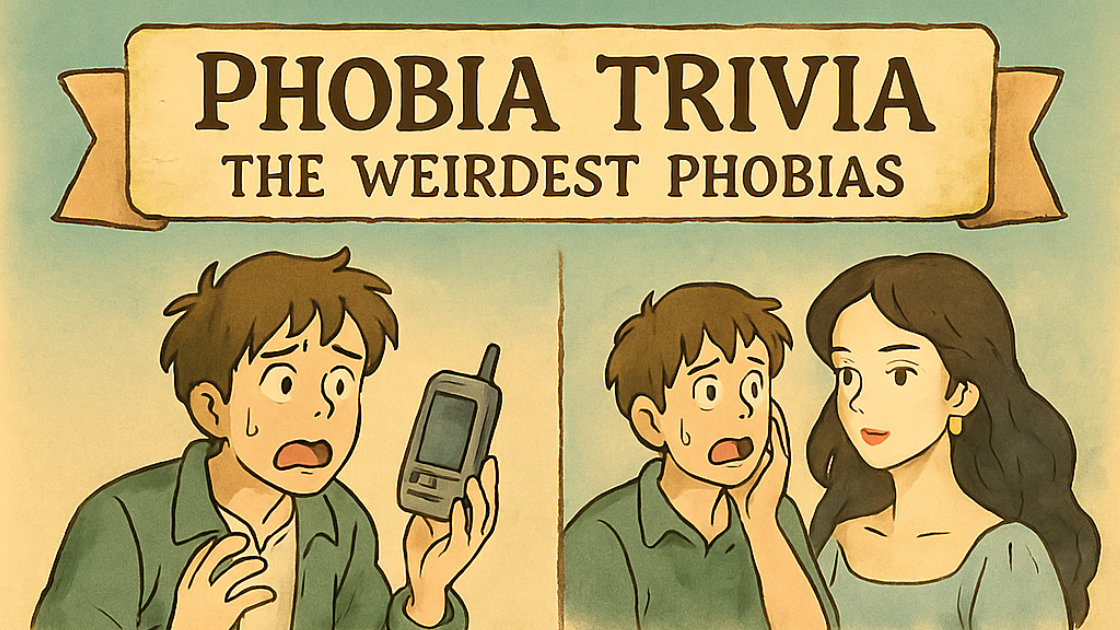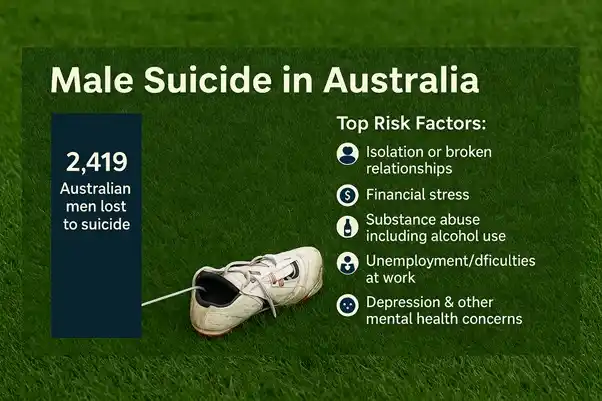Couples Counselling – An Essential Circuit Breaker For Working From Home and Relationship Stress
With the pandemic lingering around for longer than we thought, we’ve all tried our best to adapt to the new normal.
We now work from the same beds that we sleep on, order meals at home, and meet our friends on video calls. But whilst we’ve managed to maintain communication with others, many of us have unknowingly hit the mute button on our romantic relationships.
Let’s rewind to when Covid first hit. Back then, many of us thought that working from home presented us with the perfect opportunity to spend valuable time with our partners and strengthen our relationship.
A Work-Life Relationship Survey conducted in 2020 by “FlexJobs” found that 64% of 3,900 survey respondents thought that having a flexible job would benefit their romantic relationship overall.
80% of respondents also thought that more time at home would allow them to be more attentive towards their partner.
But unfortunately, it seems that the reality wasn’t quite so optimistic . As the pandemic continued to tighten its grip on the world, the boundaries between work and life began to blur, and many couples found their relationships falling flat.
The make or break of working from home
Yes, undeniably, many couples loved spending more time together and they found that working from home strengthened their relationship. But these stories were overshadowed by those that blamed lockdowns and home-working environments for escalating break-ups and complicating marriages. One US survey found that almost half of respondents (45%) found that working from home was, in fact, adding strain to their relationship.
At the start of the pandemic, some people found it especially hard to adjust to a new work routine. All of a sudden, work became more chaotic than usual, with everything happening under one roof. This was especially true for those with kids.
Then there was the fact that most couples weren’t used to seeing each other all the time. For many, the change may have been (and may continue to be) a positive thing. But as you may know, novelties often wear off. This seems to have been the case for many Australian couples. Partners, although they were physically present, soon became less and less available.
Others found that minor issues were frequently blown out of proportion, causing emotional distress. Small tiffs over things like who’d do the dishes could easily escalate into bigger arguments.
So, what is it exactly about working from home that’s ruining relationships? Let’s dive a little deeper into understanding the root of these problems.
Why is working from home straining relationships?
There are a number of reasons as to why couples experience relationship problems when they are cooped up together in times like these.
One reason is due to a loss of personal space.
Suddenly being together 24/7 was a big change for couples who were used to being apart for eight hours every day.
As the weeks went on, having your significant other around all the time quickly became the norm. There was no longer any motivation to spend valuable time together. Things that may have been natural in the past – like grabbing dinner together or sitting down to talk about the day became non-existent.
This lack of communication put stress on relationships with couples no longer effectively communicating their wants and needs.
A second reason was due to new expectations being placed on each partner in regards to who would do the household chores or who’s turn it was to look after kids.
Since the pandemic began, we’ve had numerous clients tell us that their biggest fights have broken out because of one person pulling more weight than the other.
Before the pandemic, a lot of couples had unspoken, mutual arrangements where they would divide chores between them. But this came crashing down when suddenly both partners were spending all their time in the home.
Kids were no longer sent to school with a pre-packed lunchbox or for a teacher to supervise them. Instead, there were more meals being made in the kitchen. There were more dishes to clean, more toys to pick up and more rubbish to take out.
Although these seem like minor issues, they easily became much bigger problems when emotions got involved.
This is why couples need to share in the workload, and understand how their partner is feeling each day. Some days it will be reasonable for one partner to do more of the heavy lifting. But it’s important to find this balance.
Marriages and relationships aren’t just about the rewarding moments. It’s the journey that you take together that makes those rewards all the more satisfying.
Working from home has created a new adventure that couples have to navigate. Sometimes this is difficult to figure out alone. When this is the case, couples therapy or relationship counselling can often be the breakthrough benefit that the relationship needs.
Couples counselling can help couples gain a new perspective on one another and discover alternative ways to resolve conflicts. Talking to a counsellor can improve your relationship and be beneficial for your mental health.
So, here’s some advice from a counsellor on how to improve your relationship and work around sensitive issues when the going gets tough:

- Practice active listening:
Focus on actively listening to what your partner is saying and try to understand their point of view.Often, couples half-heartedly listen to their partners to respond and react to them with a nod of the head or a mutter of agreeance. Instead – block out other distractions and give your partner the space to express themselves freely and to truly feel heard.Also refrain from cutting them off when they’re talking.Apart from simply hearing what your partner is saying, tune in to their body language and appreciate what they are feeling and communicating. Often, non-verbal cues can speak much louder than words, and when you’re able to identify these cues, it becomes much easier for you to be there for your partner when they need you.Spending more time with your partner while you both work from home will enable you to understand each other better, so use this opportunity. Verbally mirror back their words to demonstrate that you were listening to them.
- Use ‘I’ statements:
State your needs by using ‘I’ statements and avoid using phrases that might sound like you’re blaming your partner. Frame your sentences by saying ‘I feel’ and ‘I think’, instead of starting sentences focused on your partner’s actions.If you feel like your partner hasn’t been there for you when you most needed their help, try to express yourself without deflecting blame by saying things like, “I feel hurt when I have to get things done all by myself, especially on difficult days”.
- Be open about your feelings and empathise with your partner:
Be honest, open and genuine about your feelings.Develop an attitude of acceptance and non-judgement when your partner expresses their feelings, thoughts or concerns about the relationship.Avoid jumping into defence mode when you hear something that you don’t like. Try to understand the message rather than just listening to the words themselves.
- Stop comparing your relationship with others:
Comparison is the thief of intimate connection.So, move away from comparing your relationship to that of others.There is no perfect relationship, no matter what you see on social media. Remember, nobody posts photos that reflect the arguments or tough times they have with their partner.
- Set boundaries:
Whether it’s finding the right work-life balance or simply creating some space for yourself – it can only happen when you set appropriate boundaries.Make it a point to express and communicate your needs and what support you would like from your partner. And listen to what your partner wants too.Get a better understanding of how you can both contribute towards making the relationship work.If you feel guilty about asking for more time for yourself, remember that you can’t pour from an empty cup. Even though you’re in a relationship, you’re your own person. Having some time to do your own things will only help you become a better partner and contribute to a more fulfilling relationship.
- Enhancing your relationship:
Whether you’re working from home or the office, working on your personal relationship is important. Situations constantly evolve, and your relationship does too.Couples therapy can help you navigate your relationship and help you find navigational pathways that work for you. Working on your relationship is never easy, but couples therapy opens a space within which to accept each others differences and build connection. Relationship counsellors have the expertise and knowledge to be impartial and speak about your what is holding your relationship back, so that you can live a happier, more fulfilling life together.
Here are a couple of blogs written on this topic you might find useful:
What Are Australians Most Afraid Of? N...
From snakes and spiders to needles and ghosts, fear takes many forms. But what do Australians fear most in 2025? At Bayside Psychotherapy, our expert.
Is It Time For The AFL To Cast A Menta...
At Bayside Psychotherapy we are passionate about mental health and like many fellow Melbournians, many on our team are avid AFL fans. So when two of our.
Exploring Emerging Therapies: Understa...
At Mind Medicine Australia, we are dedicated to transforming the trea.
The Balance of Power in Romantic Relat...
Why do some relationships thrive while others feel like a constant tug-of-war? Power dynamics lie at the heart of this balance.











